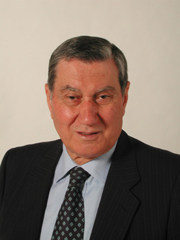
Nicola Mancino

Nicola Mancino | |
|---|---|
 Mancino in 1996 | |
| President of the Senate of the Republic | |
| In office 9 May 1996 – 29 May 2001 | |
| Preceded by | Carlo Scognamiglio Pasini |
| Succeeded by | Marcello Pera |
| Acting President of Italy | |
| In office 15 May 1999 – 18 May 1999 | |
| Prime Minister | Massimo D'Alema |
| Preceded by | Oscar Luigi Scalfaro |
| Succeeded by | Carlo Azeglio Ciampi |
| Minister of the Interior | |
| In office 28 June 1992 – 10 May 1994 | |
| Prime Minister | Giuliano Amato Carlo Azeglio Ciampi |
| Preceded by | Vincenzo Scotti |
| Succeeded by | Roberto Maroni |
| Vice-President of the High Council of Judiciary | |
| In office 1 August 2006 – 2 August 2010 | |
| President | Giorgio Napolitano |
| Preceded by | Virginio Rognoni |
| Succeeded by | Michele Vietti |
| Member of the Senate of the Republic | |
| In office 5 July 1976 – 24 July 2006 | |
| Constituency | Campania |
| President of Campania | |
| In office 11 August 1975 – 8 May 1976 | |
| Preceded by | Vittorio Cascetta |
| Succeeded by | Gaspare Russo |
| In office 21 April 1971 – 12 May 1972 | |
| Preceded by | Carlo Leone |
| Succeeded by | Alberto Servidio |
| Personal details | |
| Born | 15 October 1931 Montefalcione, Italy |
| Political party | PD (since 2007) |
| Other political affiliations | DC (1976–1994) PPI (1994–2002) DL (2002–2007) |
Nicola Mancino (born 15 October 1931) is an Italian politician who served as president of the Senate of the Republic from 1996 to 2001. He was also president of Campania's regional parliament from 1965 to 1971, governor of Campania from 1971 to 1972 and Minister of the Interior from 1992 to 1994.

Early life
Mancino was born in Montefalcione, province of Avellino (Campania). He became first provincial and then regional secretary of Democrazia Cristiana (Italy's Christian Democratic Party), being elected for the first time in the Italian Senate in 1976. So far he had been reconfirmed in all subsequent elections.

Minister of the Interior
He was Minister of the Interior from 1992 to 1994. On 1 July 1992, magistrate Paolo Borsellino had a meeting with Mancino, who at the time had just been named as Minister; Borsellino would be killed just over two weeks later with a car bomb, on 19 July. Mancino however always denied that he had met Borsellino.[1] In a television interview of 24 July 2009, judge Giuseppe Ayala said that:

Mancino himself told me that he had met Borsellino on 1 July 1992. More: Mancino showed me his meeting agenda with the name of Borsellino on it[1]
However, later Ayala refuted these words in an interview to magazine Sette. A personal agenda in possess of Borsellino's family, has an annotation by the judge saying: "1 July h 19:30 : Mancino".[2] Vittorio Aliquò, the other magistrate who was interviewing Mutolo at the time of ministry's phone call, later declared that he had accompanied Borsellino "up to the threshold of the minister's office".[3] In 2007 a letter from Paolo Borsellino's brother, Salvatore, was published. Entitled 19 luglio 1992: Una strage di stato ("19 July 1992: A state massacre"), the letter supports the hypothesis that Minister of Interiors Nicola Mancino knew the causes of the magistrate's assassination. Borsellino's brother wrote:

I ask Mancino, of whom I remembered, of the years after 1992, a hardly pushed down drop in the commemorations of Paolo in Palermo, to squeeze his memory to tell us what they talked about in the meeting with Paolo in the days immediately before his death. Or to explain us why, after calling my brother to meet him when he was interrogating Gaspare Mutolo, just 48 hours before the massacre, he had him meet the Head of Police Parisi and Bruno Contrada, a meeting from which Paolo got out shattered, at the point that he was seen holding two cigarettes at the same time... In that meeting is surely the key to his death and the Massacre of Via D'Amelio.[4]
A law enacted and signed by Mancino in 1993 during his tenure as Interior Minister permits the prosecution of those involved in racial, ethnic and religious discrimination and the incitement of hate crime. This law is commonly called the "Mancino law".[5][6]

Later career
In 1994, after the dissolution of Democrazia Cristiana, Mancino adhered to the Italian People's Party (PPI), collaborating with its secretary, Mino Martinazzoli. In July of the same year, he opposed the alliance with the right-wing coalition led by Silvio Berlusconi, and also opposed the election of Rocco Buttiglione as PPI secretary.

Later, he became a member of La Margherita (The Daisy) coalition of parties born out of the left wing of the PPI. After the victory of the center-left coalition led by Romano Prodi in the 1996 elections, Mancino was elected President of the Italian Senate, and served from 9 May 1996 until 29 May 2001.

On 24 July 2006, he left the Senate and became deputy-president of the Consiglio Superiore della Magistratura, Italy's senior council of justice. In July 2012, prosecutors in Palermo ordered Mancino to stand trial for withholding evidence about the alleged talks between the Italian state and the Mafia during the latter's bombing campaign in 1992 that assassinated, among others, the judges Giovanni Falcone and Paolo Borsellino.[7] On 20 April 2018, he was acquitted.[8]

Electoral history
| Election | House | Constituency | Party | Votes | Result | |
|---|---|---|---|---|---|---|
| 1976 | Senate of the Republic | Campania – Avellino | DC | 42,756 | ||
| 1979 | Senate of the Republic | Campania – Avellino | DC | 45,706 | ||
| 1983 | Senate of the Republic | Campania – Avellino | DC | 47,303 | ||
| 1987 | Senate of the Republic | Campania – Avellino | DC | 53,987 | ||
| 1992 | Senate of the Republic | Campania – Avellino | DC | 53,439 | ||
| 1994 | Senate of the Republic | Campania – Avellino | PPI | 57,286 | ||
| 1996 | Senate of the Republic | Campania – Avellino | PPI | 69,432 | ||
| 2001 | Senate of the Republic | Campania – Avellino | DL | 70,765 | ||
| 2006 | Senate of the Republic | Campania | DL | –[a] | ||
- ^ Elected in a closed list proportional representation system.
References
- ^ a b Borsellino, Salvatore (27 September 2010). "Le domande che non avrei voluto fare". Il Fatto Quotidiano. Retrieved 23 May 2012.
- ^ Borsellino, Salvatore. "LA REPLICA DI SALVATORE BORSELLINO AL SEN.MANCINO". Retrieved 23 May 2012.
- ^ Alfano, Chicco. "Quell'agenda rossa di Paolo Borsellino..." Archived from the original on 12 June 2009. Retrieved 23 May 2012.
- ^ "Il fratello di Borsellino: "Mancino ora sveli perché incontrò Paolo"". Il Giornale. Retrieved 23 May 2012.
- ^ "Criminal Code (1993) (excerpts)". LegislatiOnline. Archived from the original on 12 October 2020. Retrieved 10 October 2020.
- ^ "Furore as family minister moots scrapping anti-fascist Mancino law". ANSA on Politics. 3 August 2018.
- ^ Italy: Ex-interior minister implicated in mafia negotiations, Adnkronos, 25 July 2012
- ^ "Trattativa Stato-mafia, condannati Mori, De Donno, Dell'Utri e Bagarella. Assolto Mancino". La Repubblica (in Italian). 20 April 2018.
External links
- Consiglio Superiore della Magistratura
- Nicola Mancino at Italian Senate, XIII Legislature
- Nicola Mancino at Italian Senate, XIV Legislature
- Nicola Mancino at Radio Radicale
- 1931 births
- Living people
- People from the Province of Avellino
- Ministers of the interior of Italy
- Presidents of the Italian Senate
- Presidents of Campania
- Christian Democracy (Italy) politicians
- Honorary Knights Grand Cross of the Order of the British Empire
- 20th-century Italian politicians
- Democracy is Freedom – The Daisy politicians
- Acting presidents of Italy
See what we do next...
OR
By submitting your email or phone number, you're giving mschf permission to send you email and/or recurring marketing texts. Data rates may apply. Text stop to cancel, help for help.
Success: You're subscribed now !




